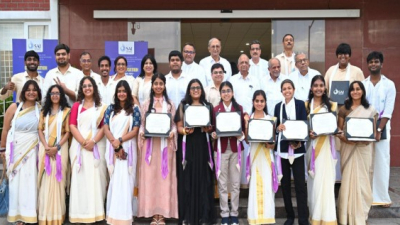The world is evolving faster than ever before, and education is no longer just about memorizing facts or acing exams. Students today are preparing for careers and lifestyles that are rapidly transforming with the rise of artificial intelligence, globalization, and digital innovation. To thrive in the future, learners must focus on developing a wide range of skills that extend beyond traditional academics. These skills not only enhance employability but also empower students to become adaptable, creative, and confident individuals who can navigate challenges with resilience.
In this article, we will explore the top 10 skills students need for the future and why each of them is essential for success in an interconnected world.
1. Critical Thinking and Problem-Solving
One of the most crucial skills for students in the future is critical thinking. The ability to analyze information, question assumptions, and evaluate solutions is what separates future-ready individuals from those who simply follow instructions. Employers increasingly value candidates who can identify problems and approach them with logical, innovative strategies. Beyond the workplace, critical thinking helps students make informed decisions in everyday life, from financial planning to personal growth. By practicing inquiry-based learning and engaging in real-world problem-solving exercises, students can strengthen this skill early in their academic journey.
2. Creativity and Innovation
As automation continues to replace routine tasks, creativity stands out as a uniquely human advantage. Students who can generate fresh ideas, design new solutions, or approach challenges with imagination will always be in demand. Creativity is not limited to the arts, but also applies to science, technology, and business. Innovation thrives when students learn to take risks, experiment, and embrace failure as a stepping stone to success. Future-ready students who can combine creativity with practical skills will be the ones driving entrepreneurship, digital transformation, and groundbreaking discoveries.
3. Digital Literacy
In an age dominated by technology, digital literacy is no longer optional. Students must be able to navigate online platforms, evaluate digital content for accuracy, and use tools effectively for communication, research, and collaboration. Digital literacy also includes understanding cybersecurity, managing digital footprints, and learning how to responsibly use social media. As remote learning, artificial intelligence, and virtual collaboration become the norm, students who are digitally fluent will have a significant advantage in both education and career opportunities.
4. Communication and Collaboration
The future of work is highly collaborative, often requiring teams from different cultures, time zones, and backgrounds to work together seamlessly. Effective communication, both written and verbal, is key to ensuring ideas are clearly expressed and understood. Collaboration builds on this skill by encouraging teamwork, empathy, and compromise. Students who learn to listen actively, respect diverse perspectives, and contribute meaningfully in group settings will be able to thrive in any professional environment.
5. Emotional Intelligence
Emotional intelligence, often referred to as EQ, is the ability to understand and manage one’s own emotions while empathizing with others. In the future, where human interaction and teamwork remain central despite technological advances, EQ will be a defining factor of success. Students with strong emotional intelligence are better leaders, more resilient under pressure, and more effective in building healthy relationships. Schools and parents can nurture this skill by encouraging mindfulness, empathy-based activities, and open discussions about emotions.
6. Adaptability and Resilience
The pace of change in today’s world requires students to be adaptable. Career paths are no longer linear, and industries can transform overnight due to economic shifts or technological disruptions. Resilience allows students to recover quickly from setbacks, while adaptability ensures they can adjust to new environments and expectations. Developing a growth mindset—believing that abilities can be developed through effort—helps students embrace challenges as opportunities for growth rather than obstacles.
7. Leadership and Initiative
Future leaders will not just be those in formal positions of authority but also individuals who can inspire, guide, and take initiative in any situation. Students who cultivate leadership skills learn to make decisions, delegate responsibilities, and motivate others. Initiative goes hand-in-hand with leadership, as it reflects the ability to identify opportunities and act without waiting for external direction. These skills are highly valued in both entrepreneurial ventures and corporate environments, as they demonstrate confidence and a proactive mindset.
8. Cultural Awareness and Global Citizenship
The future belongs to those who can work and live in a multicultural world. With globalization connecting communities, businesses, and governments, students must understand cultural diversity and practice tolerance, respect, and inclusivity. Global citizenship involves recognizing one’s role in contributing positively to society, whether through sustainability, social justice, or ethical decision-making. By fostering cultural awareness, students prepare themselves to collaborate internationally and make a meaningful impact on the world.
9. Financial and Entrepreneurial Literacy
As the economy evolves, financial literacy becomes a survival skill. Students who understand budgeting, saving, investing, and responsible spending are better prepared to manage their future. Alongside this, entrepreneurial literacy empowers students to identify opportunities, innovate, and even build businesses. Together, these skills prepare learners to achieve independence and contribute to economic growth. Introducing financial education early can prevent debt-related struggles and encourage a future generation of financially responsible adults.
10. Lifelong Learning and Curiosity
Perhaps the most important skill of all is the willingness to learn continuously. The careers of tomorrow may require constant upskilling, and curiosity is what fuels lifelong learning. Students must embrace the idea that education does not end with a diploma but continues through professional courses, online platforms, and personal exploration. Lifelong learners stay relevant in changing industries and remain open to new perspectives and experiences. Cultivating curiosity ensures that students never stop growing, no matter where life takes them.
Conclusion
The future is uncertain, but one thing is clear: students who develop a diverse set of skills will have a greater chance of thriving in a competitive, globalized, and technology-driven world. Critical thinking, creativity, emotional intelligence, and adaptability are no longer optional, but essential. Digital literacy, leadership, and global citizenship prepare students to contribute positively to society, while financial literacy and lifelong learning ensure personal and professional sustainability. By focusing on these top 10 skills, today’s learners can shape themselves into tomorrow’s leaders, innovators, and problem-solvers.
For educators and parents, the challenge is to create environments where these skills can flourish. For students, the opportunity lies in embracing every learning experience with curiosity and determination. The future belongs to those who are prepared, and preparation starts today.
Frequently Asked Questions
Q1. What are the most important skills students should learn for the future?
Answer. The most important skills include critical thinking, creativity, digital literacy, communication, emotional intelligence, adaptability, leadership, cultural awareness, financial literacy, and lifelong learning.
Q2. Why is digital literacy so important for students?
Answer. Digital literacy equips students to navigate technology effectively, use online resources responsibly, and remain competitive in an increasingly digital workforce.
Q3. How can students improve their adaptability and resilience?
Answer. Students can improve by developing a growth mindset, embracing challenges, and viewing setbacks as opportunities to learn and grow stronger.
Q4. What role does emotional intelligence play in student success?
Answer. Emotional intelligence helps students build stronger relationships, manage stress, and develop leadership qualities, all of which are essential for academic and career success.
Q5. How can lifelong learning benefit students in the future?
Answer. Lifelong learning keeps students adaptable, helps them stay updated with industry changes, and ensures continuous personal and professional growth.




